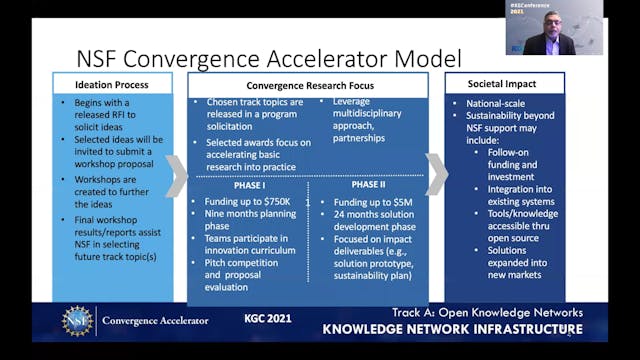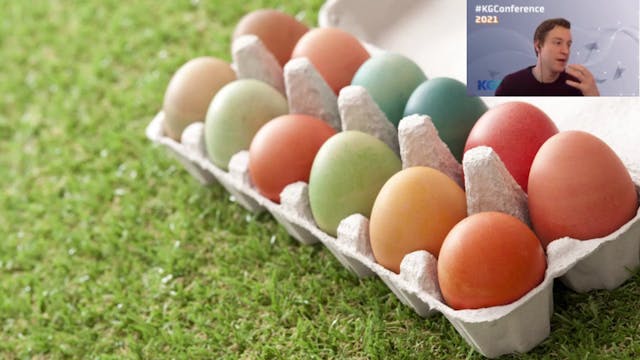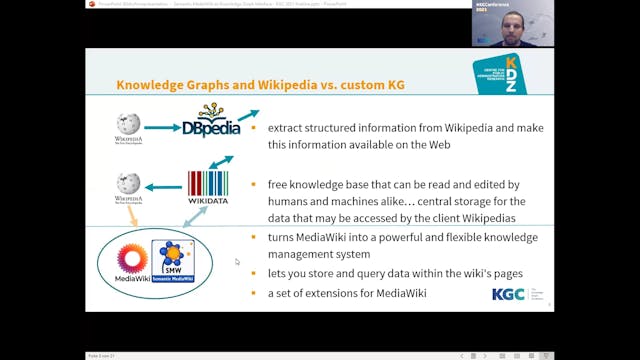Konstantin Todorov | Browsing The Web Of Claims
KGC 2021
•
20m
How do falsehoods spread on the web? This and other questions related to the propagation of fake news and biased discourse in the public area have been drawing increasing interest in different communities from social sciences to artificial intelligence. Online discourse, i.e. claims and opinions shared online, together with their associated contexts (authors, salient entities, related events) constitute a valuable source of insights to these questions.
While knowledge graphs of today enable data reuse and federation, improving information retrieval on the web and facilitating knowledge discovery in various fields, they do not store information about claims and related online discourse data, making it difficult to access, query and reuse this wealth of information.
Hence, we have built ClaimsKG — a knowledge graph of fact checked claims and their related metadata, such as the claims’ truth labels, authors, topics, keywords and references. The knowledge graph is built by extracting information from a number of popular fact-checking web portals and structuring it following a specifically developed for this purpose conceptual data model mainly based on schema.org and the NIF vocabularies. Among other applications, ClaimsKG provides ground truth data for a number of tasks relevant to the analysis of societal debates on the web.
In this talk, I will first present three tools that operate on the data of ClaimsKG: (1) the Claims Explorer, which allows us to navigate through our data and perform faceted search; (2) the Claims Statistical Observatory, which helps uncover trends; and (3) the ClaimLinker, which allows to link arbitrary text to claims from ClaimsKG (or any other Knowledge graph containing claims), hence assisting the task of fact verification. I will further discuss perspectives on modeling claims in a generalized and contextualized manner, as well as related challenges such as claim disambiguation and the assessment of claim relatedness.
Konstantin Todorov presents viewers with ClaimsKG, a knowledge graph fact check claim. Konstantin and his team have developed ClaimsKG to allow researchers and many others to discover claims and involved entities to provide for fact-checking. In this talk Konstatin will provide motivation for this project and some examples of use cases for ClaimsKG. Through the use of a semi-automated pipeline, ClaimsKG is meant to provide an entry for researchers and be able to check whether those claims are true or not making sure they can use the data they have been provided for their projects and research. Konstantin believes that there could be an expansion on ClaimsKG and that there are a variety of use cases in social sciences using ClaimsKG. #knowledgegraphs #knowledgegraphconference #knowledgegraphuses #knowledgegraphai
Up Next in KGC 2021
-
Chaitan Baru | Open Knowledge Network
The concept of an Open Knowledge Network (OKN) is one of the components of the National Science Foundation’s Harnessing the Data Revolution (HDR) Big Idea, with the objective of providing semantic information infrastructure. By encoding information and knowledge about real-world entities and thei...
-
Ben De Meester | PROV4ITDaTa: Flexibl...
Personal Knowledge Graph generation is no longer a cumbersome technical endeavor. PROV4ITDaTa is an MIT open source platform to provide a smooth user experience for generating knowledge graphs from your online web services, such as Google, Flickr, and Imgur, into your personal data space. This br...
-
Bernhard Krabina | Semantic MediaWiki...
Semantic MediaWiki (SMW), which was introduced as early as in 2006, has since gone on to establish a vital community and is currently one of the few semantic wiki solutions still in existence. SMW is an extension of MediaWiki, the software used for Wikipedia and many other projects, resulting in ...



